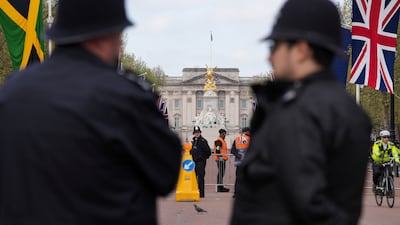Police will have an “extremely low threshold” for disruptive behaviour at King Charles III’s coronation, the senior officer overseeing the event has warned.
In one of Britain’s biggest ever security operations, deputy assistant commissioner Ade Adelekan told The National that officers will make a decision on using live facial recognition technology within the next 24 hours.
The officer and other senior figures have called on the public to be on high alert for any suspicious behaviour during Saturday’s service.
“If people feel something doesn’t look right, tell us and we will investigate,” Mr Adelekan said.
A security force of about 9,000 will patrol central London in what was described as a “momentous event” for Britain.
That security has already been tested after a man confronted personnel outside Buckingham Palace on Tuesday night, throwing live shotgun cartridges into the forecourt.
The incident was rapidly dealt with by police and explosive experts, and the suspect was arrested, but it highlighted the risks posed by the large crowds expected for the coronation.
By Thursday, it will be announced whether police have decided to use facial recognition technology on crowds in Britain for only the second time, following its first use at Queen Elizabeth II’s funeral in September.
A watch list, understood to contain up to 1,000 people, has been compiled for those who have warrants out for their arrest “or place a risk to the public”, Mr Adelekan said. He refused to confirm whether terrorists were on the database.
Gen Lord David Richards, who will be carrying a ceremonial sword ahead of the king during the coronation service in Westminster Abbey, told The National in an earlier interview that the public had “an obligation to keep our eyes open”.
“Because it might just be someone, not in the Westminster Abbey audience I hope, but among the spectators on the Mall,” he said. ”
It is a national obligation to make sure that the very few people who might for whatever personal reason want to disrupt this great occasion don't manage to do so.”

Police will also be mindful of protests groups such as Extinction Rebellion who might try to disrupt the military procession using glue or handcuffs to attach themselves to fixed objects.
“We have an extremely low threshold for anybody or anything that will disrupt this event and what you will see is very swift action from us,” Mr Adelekan said.
New laws to curb protests came into force on Wednesday with protesters who block roads facing up to 12 months in jail.
Tom Tugendhat, the Security Minister, said the complexity of the security operation was heightened by the presence of many foreign leaders.
“It's perfectly possible that we're dealing with protest groups that have nothing to do with the UK, but are seeking to protest against a foreign leader who's visiting, or seeking to make a complaint about something that's happening hundreds or thousands of miles away,” he told the BBC.
More than 10,000 military personnel are taking part in the ceremony plus the 9,000 police on the procession route between Buckingham Palace and Westminster Abbey.
Armed officers will be ready to respond to any incidents, alongside marine support from the Thames and dogs units.
Even before a call was made on using facial recognition, human rights campaigners heavily criticised its potential use.
“Facial recognition is a dystopian tool that violates our rights and threatens our liberty,” said Liberty's policy and campaigns manager Emmanuelle Andrews.
“We all have the right to go about our lives without being surveilled and monitored — but this weekend, anyone in the vicinity of the king's coronation is at risk of having their face scanned by this oppressive technology.”
Big Brother Watch's legal and policy officer Madeleine Stone said: “The use of live facial recognition would have a serious chilling effect on the right to free speech on a day when thousands will be considering celebrating or protesting.”


